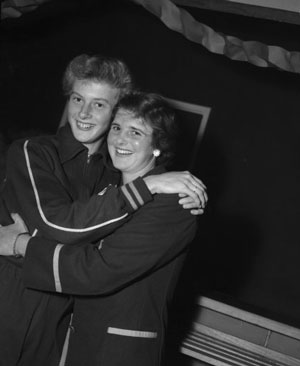
June Maston was a pupil at Fort Street High School in Sydney, before studying at Sydney Teachers College to become a physical education teacher. Her athletic career was both lengthy and diverse – delivering an Olympic silver medal of her own and a decorated coaching career that produced Olympians and champions.
June competed in sprint events for Sydney’s Western Suburbs Women’s Club after commencing her involvement in the sport in 1945. Within a year she had won the NSW 440 yards title in 62.2 seconds, a feat she repeated in 1947 (in 62.0) and 1948 in 58.2, which was an Australian record.
But at the time the 440 yards or its metric equivalent was not an Olympic event for women, so June’s chances of international selection lay in the shorter sprints. Fortunately for her, at the 1948 Women’s National Championships in Sydney, June finished fourth in the 100 yards and was a member of the winning NSW relay team. It was enough to gain selection for the London Olympics of that year, both as a relay runner and the long jump.
Regrettably once in war-ravaged England, the five member Australian women’s team found opportunities hard to come by and had no real competition prior to the Games. Yet they did amazingly well.
June first competed in the long jump qualification but had run up problems, jumping only 5.06m and failed to make the final held the same day. However the 4x100m relay was the great success.
The team finished a close second in the first heat behind the Canadians in 48.0, before drawing lane one in the final. Shirley Strickland gave the team a great start and handed over to June who ran one of her best ever races, delivering the baton safely to third leg, Betty McKinnon.
The Australians were second into the straight but Joyce King quickly raced past Denmark to take the lead, only to be caught on the line by the greatest female athlete of the era, Fanny Blankers-Koen, who ensured a Netherlands win in 47.5 to Australia’s 47.6. It was the fastest an Australian team had ever run but more importantly delivered a silver medal to take home.
In 1949 June married 1948 Olympic water-polo player and rugby union star, Jack Ferguson with whom she subsequently had five children. She continued to compete but more significantly, and importantly for Australian athletics, she started to coach.
In 1951 she began to mentor a young 13 year old girl, Betty Cuthbert, at Parramatta Home Science School where she taught physical education. It was the beginning of a most fruitful partnership. June coached Betty throughout her athletic career which resulted in four Olympic gold medals amongst countless other accolades.
June was unable to witness Betty win the 100 metres in Melbourne as she had recently given birth to her third child, but was there in time for the great victories in the 200 metres and the relay.
Later, it was June who advised her charge to try the 400 metres when Betty decided to make a comeback to athletics in the 1960s and the result was another gold medal, this time in Tokyo in 1964.
But June’s work was far from done, enjoying further Olympic coaching success – most notably with Maureen Caird. Caird had amazing ability and was a sensational junior, yet only June thought she would win a medal at the 1968 Games in Mexico City. At just 17 years of age, Caird won gold – by a tenth of a second from team-mate Pam Kilborn.
Other notable athletes coached by June amongst many were Olympians Sandra Brown and Penny Gillies. But she worked just as hard for hundreds of athletes at club, state and national level and was regarded as an icon in the coaching community.
June was a pathfinder for all coaches, but particularly for women, few of whom engaged in the activity at the time she started out. But significantly, many followed in her footsteps, particularly in her home state of New South Wales.
June’s roles in athletics were many. In 1957 she formed the Cumberland Women’s Athletic Club and remained their coach until 1988. She also became an expert commentator on athletics for ten years with the ABC.
June pursed educational opportunities, earning an MA in physical education. She also lectured at the Sydney Institute of Education. In 1967 she was made a Member of the British Empire in recognition for her amazing contribution to athletics in Australia.
It is fitting that June Ferguson becomes the first member of the Athletics Australia Hall of Fame, inducted principally for her achievements as a coach.
Paul Jenes
AA Statistician
President ATFS
Acknowledgements: Ray White & Malcolm Harrison – “100 Years of the NSW AAA, The Official Centenary History of the NSW AAA 1887-1987”; Paul Jenes – “Fields of Green and Lanes of Gold”; Edgar Tanner – “Australia at the Olympic Games, London 1948”; Mark Butler – “Athletics Statistics Book”; Harry Gordon – “Australia and the Olympic Games”; Anthony Hough; David Tarbotton; Graham Thomas

